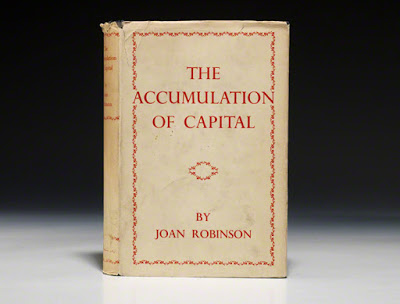Summary:
My favorite is still Essays in the Theory of Economic Growth Back from a summer road trip. Should start to blog more consistently soon. Here a new paper from John King in the last issue of ROKE. From the abstract: Joan Robinson's magnum opus, The Accumulation of Capital, was published 60 years ago, in 1956. I begin this diamond jubilee assessment by explaining the intellectual background to the book, placing Robinson's attempt to ‘generalise the General Theory’ in the context of the contemporary work of Harrod, Kaldor and Kalecki. I then provide a brief summary of the eight parts of the book before focusing on the analytical core, the analysis of ‘accumulation in the long run’ that is provided in Book II. Next I outline the critical reception of the book in the late 1950s and Robinson's reaction to it, both then and later in her career. I conclude by documenting the rather limited influence of The Accumulation of Capital in the longer term, even among heterodox economists, and conclude that the book was a noble failure. Read full paper here.
Topics:
Matias Vernengo considers the following as important: Demand-led Growth, Joan Robinson, Keynes
This could be interesting, too:
My favorite is still Essays in the Theory of Economic Growth Back from a summer road trip. Should start to blog more consistently soon. Here a new paper from John King in the last issue of ROKE. From the abstract: Joan Robinson's magnum opus, The Accumulation of Capital, was published 60 years ago, in 1956. I begin this diamond jubilee assessment by explaining the intellectual background to the book, placing Robinson's attempt to ‘generalise the General Theory’ in the context of the contemporary work of Harrod, Kaldor and Kalecki. I then provide a brief summary of the eight parts of the book before focusing on the analytical core, the analysis of ‘accumulation in the long run’ that is provided in Book II. Next I outline the critical reception of the book in the late 1950s and Robinson's reaction to it, both then and later in her career. I conclude by documenting the rather limited influence of The Accumulation of Capital in the longer term, even among heterodox economists, and conclude that the book was a noble failure. Read full paper here.
Topics:
Matias Vernengo considers the following as important: Demand-led Growth, Joan Robinson, Keynes
This could be interesting, too:
Lars Pålsson Syll writes The Road Not Taken
Matias Vernengo writes Paul Davidson (1930-2024)
Matias Vernengo writes Keynes’ denial of conflict: a reply to Professor Heise’s critique
Matias Vernengo writes Demand-led Growth In Rio
My favorite is still Essays in the Theory of Economic Growth
Back from a summer road trip. Should start to blog more consistently soon. Here a new paper from John King in the last issue of ROKE. From the abstract:
Joan Robinson's magnum opus, The Accumulation of Capital, was published 60 years ago, in 1956. I begin this diamond jubilee assessment by explaining the intellectual background to the book, placing Robinson's attempt to ‘generalise the General Theory’ in the context of the contemporary work of Harrod, Kaldor and Kalecki. I then provide a brief summary of the eight parts of the book before focusing on the analytical core, the analysis of ‘accumulation in the long run’ that is provided in Book II. Next I outline the critical reception of the book in the late 1950s and Robinson's reaction to it, both then and later in her career. I conclude by documenting the rather limited influence of The Accumulation of Capital in the longer term, even among heterodox economists, and conclude that the book was a noble failure.Read full paper here.

